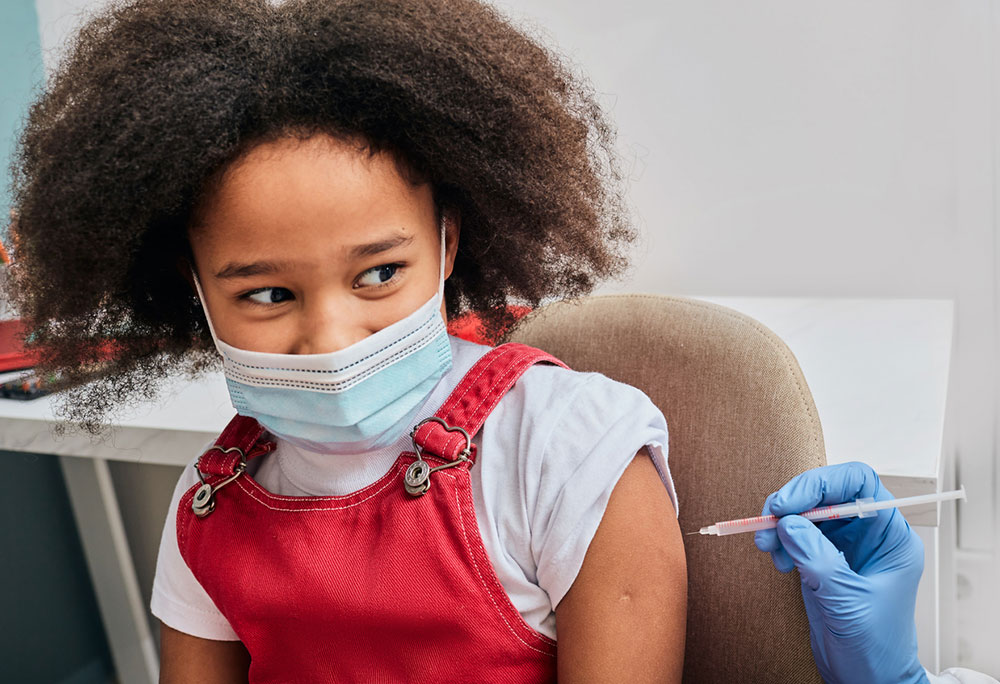Child Vaccination Rates Rise Slightly, But Parents' Intention to Vaccinate Drops
Parents of kids under 5 are the least likely to report they plan to vaccinate them
Get all our news
We see a trend in the direction that public health experts would want, which echoes trends we saw with adult vaccination – that is, people grow more comfortable with time.”
James Druckman
IPR political scientist

How have parents’ likelihood of vaccinating their kids changed since vaccines were authorized for 5- to 15-year-olds last year?
A recent national survey reveals that parents of children between the ages of 5–11 and 12–18 are vaccinating their children at a slightly higher rate than in 2021. But the rise of the Omicron variant this winter does not seem to have impacted parents’ intentions of vaccinating their children.
The percentage of parents with kids of all ages who said they were "somewhat" or "very likely" to vaccinate their kids has decreased slightly from 62% in November 2021 to 61% in January 2022. Those with children under 5 are the least likely to say they plan to vaccinate their children.
But reported vaccination rates for children are up slightly as of November. In January 2022, 57% of parents with 12- and 18-year-olds report they vaccinated their children, up 3 percentage points from September. And 36% of parents of children ages 5–11 vaccinated them, a 9-percentage point increase.
“We see a trend in the direction that public health experts would want, which echoes trends we saw with adult vaccination—that is, people grow more comfortable with time,” IPR political scientist James Druckman said. "That said, it remains to be seen whether the trend will hit a ceiling and how parents will react should regular boosters become required."
Druckman co-authored the report with scholars from Harvard, Rutgers, and Northeastern universities, as well as IPR graduate research assistants Caroline Pippert and Jennifer Lin.
From December 22, 2021, to January 24, 2022, the researchers surveyed nearly 6,000 parents across the country about whether they had vaccinated their children and to see if the likelihood of vaccinating them had changed over the last four months, when parents were last surveyed. The FDA authorized emergency use of the Pfizer-BioNTech COVID-19 Vaccine for 12- to 15-year-olds in May 2021 and for 5- to 11-year-old kids in October 2021.
On February 25, 2022, the Centers for Disease Control (CDC) eased mask guidelines for about 70% of Americans, and many states and schools are lifting or plan to lift mask mandates in the next several weeks. The roll back of mask-wearing restrictions marks a shift in public health recommendations around the coronavirus, though only two-thirds of Americans are fully vaccinated.
As in previous reports, the survey highlights stark divides over which parents plan to vaccinate their children in the future. Parents who identify as Democrats are more likely than parents who identify as Republicans to say they plan to vaccinate their children in every age group. The largest gap—34 percentage points—is between Democratic and Republicans parents of children younger than 11.
Asian American parents are the most likely to report that they will vaccinate their children, followed by Hispanic parents, with White and Black parents being the most hesitant no matter the age of their children. The largest gaps show up among parents with kids younger than 5, with only 52% of White and 40% of Black parents saying they intend to vaccinate their children compared to 71% of Asian American and 62% of Hispanic parents.
Other key findings:
- Some of the largest divides around vaccines are among parents of different incomes levels. Parents of kids under 5 making over $150,000 are more likely—by 38 percentage points—than those making under $25,000 to say they are somewhat or very likely to vaccinate their kids.
- Geography continues to play a role in vaccine enthusiasm.
- Urban parents with children 5 and younger are 29 percentage points more likely than rural parents to say they intend to vaccinate their children.
- Parents with children 5 and younger living in the Northeast (64%) and West (61%) are more likely than those in the Midwest (44%) and South (51%) to report their intentions of vaccinating their kids.
- Parents with a college degree are 27 percentage points more likely than parents without one to report they will vaccinate their children who are 11 years old and younger.
Read the report.
James Druckman is the Payson S. Wild Professor of Political Science and IPR associate director and fellow. Jennifer Lin and Caroline Pippert are IPR graduate research assistants and PhD students in political science.
Photo credit: iStock
Published: March 10, 2022.


